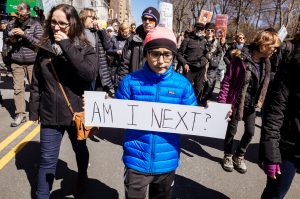By Julia Ginther
for the “Progressive Views” column, Boerne Star, April 23, 2020

Ms. Ginther was the winner of the 2021 Civic Engagement Scholarship sponsored by the Boerne Area Democrats. She is a senior at Boerne Champion High School and plans to attend Northeastern University in Boston in the fall. She wrote the below essay based on the following prompt: “Consider the numerous challenges facing our country today, such as the environment, health care, civil rights, education and immigration. Pick an issue that you think is the most critical, explain its importance/implications, and describe how you would advise our government to address this challenge.”
America is referred to as “a city upon a hill:” a shining example of democracy for the rest of the world. America prides itself on this reputation, but nonetheless is a work in progress too. Despite being a stronghold of democracy, the United States has alarmingly low voter-turnout. Voting data collected from the 35 most developed nations ranked the US 30th , with a voter turnout in 2016 of just 54.8%. This is clearly a problem, especially for a nation with a “perfect democracy.” By increasing voter turnout, the United States would be better able to solve the numerous other issues Americans face.
The United States having one the lowest voter turnouts is a symbolic indicator that our government is not working on behalf of all its citizens. Low voter turnout can seriously impact the outcomes of our elections and limit changes that could be good for our nation. As a whole, socioeconomic status has a huge impact on voter turnout, suggesting that there is a gap in representation in our public policy and priorities based on economic status. However, the most detrimental effect of low voter turnout is this: it exacerbates the myth that your vote doesn’t count.
One of the biggest reasons eligible citizens don’t vote is due to widespread doubt in our election process. The “winner-takes-all” plan of the Electoral College that most states use consistently leaves those in the minority of a state’s political ideology feeling that their votes are insignificant. So why bother? If states adopted the district plan of the Electoral College, this would dramatically improve the idea that everyone’s vote does count, leading to higher turnout. Currently, only Nebraska and Maine use the district plan. Their voter turnout rates in 2020 were 76% and 78% compared to the 66% the nation averaged in 2020. It’s clear that the district plan encourages voting and political involvement.
More action could be taken by the government to increase turnout by simply making the voting process more accessible to all, particularly lower-income areas. Some solutions stress that the government should mandate that high schools offer voter registration to seniors, or even consider automatically registering all citizens on their eighteenth birthday. State governments should also allow same day voter registration, that way no one would be turned down on election day due to lack of registration. Currently, seventeen states and the District of Columbia offer same day voter registration.
Over the past few weeks, state legislatures of Arizona and Georgia have come under fire for bills that are clear voter suppression and set a dangerous precedent. For example, Georgia recently passed a bill criminalizing the act of handing out food or water to voters waiting in lines. This is an unfortunate attack on the well-being of elderly, handicapped, and those who require assistance in long waiting lines. It’s vital that all state and federal governments push back against these banana republic initiatives to limit voting. Congress should act to prevent these bills from taking hold by passing laws that expand voting accessibility nationwide.
There’s no doubt that the United States is faced with unprecedented issues requiring utmost attention. However, if we want to be united in navigating these waters successfully, the only way to do so is to unite through voting. Improving voter turnout will facilitate the increased input needed to tackle the storms ahead. By fixing the plague of low voter-turnout, we will improve our democracy and be better equipped to provide solutions to the ever-growing problems we face. I am confident that our country will find our moral compass and address the blatant attacks on voter rights.
[webmaster note: since Ms. Ginther wrote this article for the scholarship contest, the Texas Legislature is working on its own voter suppression bills, House Bill 6 and Senate Bill 7. Find out more on the KCDP website or stories on the Texas Tribune website, and take action now against these bills.]


